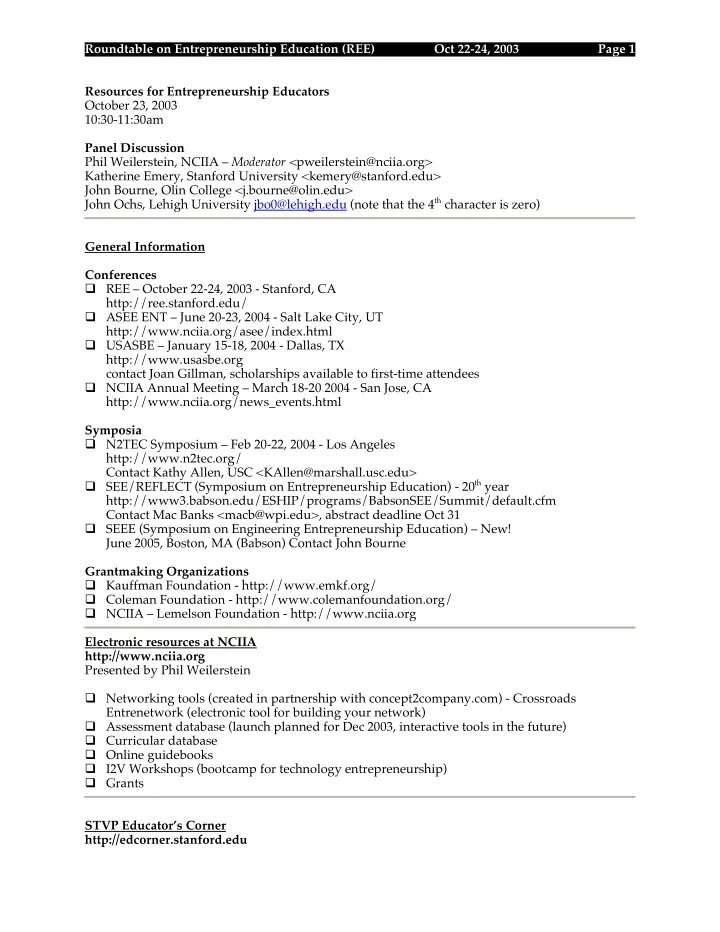

Roundtable on Entrepreneurship Education (REE) Oct 22-24, 2003 Page 1 Resources for Entrepreneurship Educators October 23, 2003 10:30-11:30am Panel Discussion Phil Weilerstein, NCIIA – Moderator < pweilerstein@nciia.org> Katherine Emery, Stanford University <kemery@stanford.edu> John Bourne, Olin College <j.bourne@olin.edu> John Ochs, Lehigh University jbo0@lehigh.edu (note that the 4 th character is zero) General Information Conferences q REE – October 22-24, 2003 - Stanford, CA http://ree.stanford.edu/ q ASEE ENT – June 20-23, 2004 - Salt Lake City, UT http://www.nciia.org/asee/index.html q USASBE – January 15-18, 2004 - Dallas, TX http://www.usasbe.org contact Joan Gillman, scholarships available to first-time attendees q NCIIA Annual Meeting – March 18-20 2004 - San Jose, CA http://www.nciia.org/news_events.html Symposia q N2TEC Symposium – Feb 20-22, 2004 - Los Angeles http://www.n2tec.org/ Contact Kathy Allen, USC <KAllen@marshall.usc.edu> q SEE/REFLECT (Symposium on Entrepreneurship Education) - 20 th year http://www3.babson.edu/ESHIP/programs/BabsonSEE/Summit/default.cfm Contact Mac Banks <macb@wpi.edu>, abstract deadline Oct 31 q SEEE (Symposium on Engineering Entrepreneurship Education) – New! June 2005, Boston, MA (Babson) Contact John Bourne Grantmaking Organizations q Kauffman Foundation - http://www.emkf.org/ q Coleman Foundation - http://www.colemanfoundation.org/ q NCIIA – Lemelson Foundation - http://www.nciia.org Electronic resources at NCIIA http://www.nciia.org Presented by Phil Weilerstein q Networking tools (created in partnership with concept2company.com) - Crossroads Entrenetwork (electronic tool for building your network) q Assessment database (launch planned for Dec 2003, interactive tools in the future) q Curricular database q Online guidebooks q I2V Workshops (bootcamp for technology entrepreneurship) q Grants STVP Educator’s Corner http://edcorner.stanford.edu
Roundtable on Entrepreneurship Education (REE) Oct 22-24, 2003 Page 2 Presented by Katherine Emery q Designed for faculty, this is a database of teaching entrepreneurship and community resources (with a focus on engineers and scientists, yet it has a broader application) q Diverse resources can be downloaded to help faculty to: 1. Build a center ß risks and rewards ß work/study programs ß grants 2. Design a course ß syllabi ß reading lists ß videos of leading entrepreneurs/thought leaders ß case studies 3. Network with colleagues ß conferences ß associations ß newsgroups ß journals ß awards Searchable Index q The Entrepreneurial Perspective q The Entrepreneurial Process q Skill Development q Theoretical Concepts What we’d like from REE participants: As this is version 1.0, we would appreciate your feedback on and contributions to: q Course outlines from your school q Other content, e.g., video clips q Modifications to the index or improvements on the search tools q Sign up online! SEEE (Symposium on Engineering Entrepreneurship Education) Presented by John Bourne SEEE is a new meeting being planned for June 2005, at Babson College in Boston, MA. Tentative topics include: q Business simulation during 4-day symposium q Link to SBIR – teaching with research q Timmons model of entrepreneurship q Case teach method q Case writing sessions Your ideas would be welcome. Top 10 Resources to Build your Entrepreneurship Initiative Presented by John Ochs 1. Cross disciplinary teams of faculty (action-oriented) 2. Keep administration on your side
Roundtable on Entrepreneurship Education (REE) Oct 22-24, 2003 Page 3 3. Use internal and external evaluators to help you continually improve 4. Engage support from alumni and industrial partners 5. Engage students in design and evaluation of courses 6. Start with your existing curriculum (build on successes, pilot courses) 7. Industry support (dollars, time and knowledge) 8. Seek sustainable funding for infrastructure (staff support, materials, etc.) 9. Internal and external public relations 10. Surround yourself with positive, excellent people Q. How do you get faculty involved? A. John O: Find people like-minded. Financial incentives are not very sustainable. Phil: Think long-term and build this into the culture. John B.: And, get to the students early (through courses in the first few semesters). Q. The engineering curriculum is already so crowded. How do you get around this? A. Phil: integrate the topics into existing courses. John O.: Engineering workshop (a course requirement) incorporates entrepreneurship concepts, 5 out of 7 majors’ interdisciplinary capstone projects. Accreditation was aided by having this program.
Recommend
More recommend